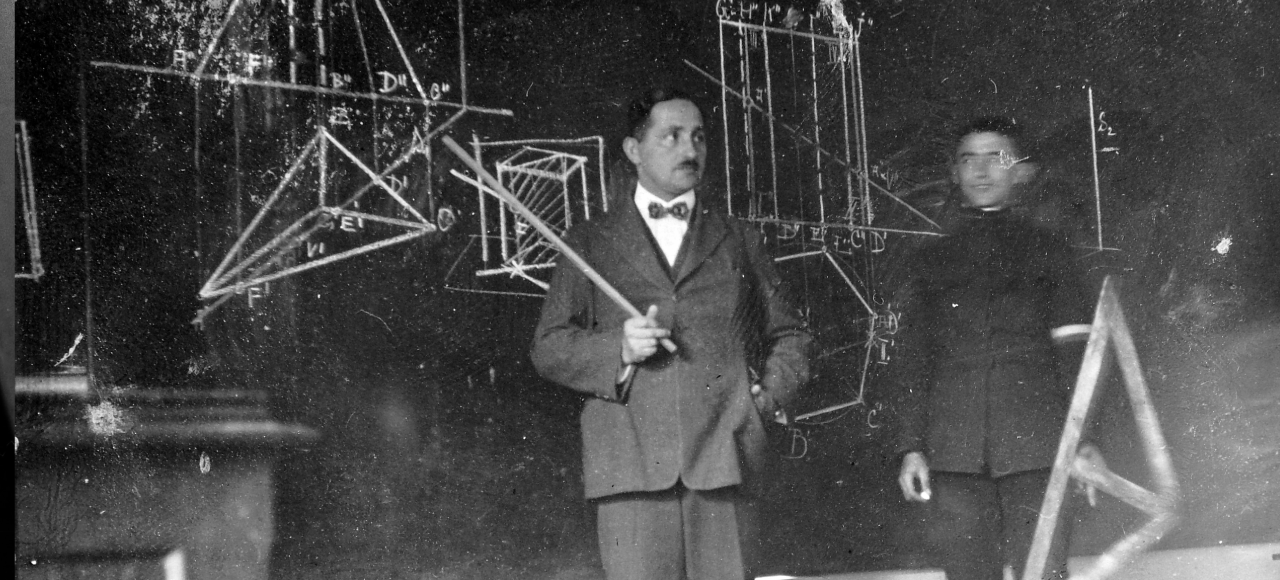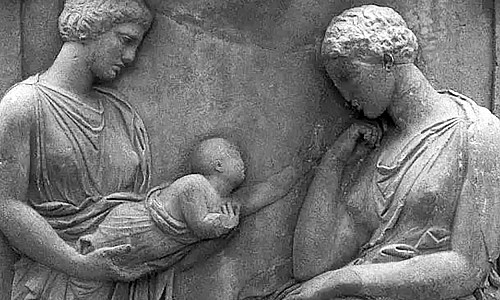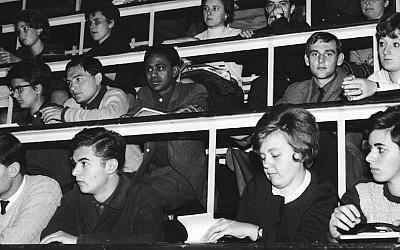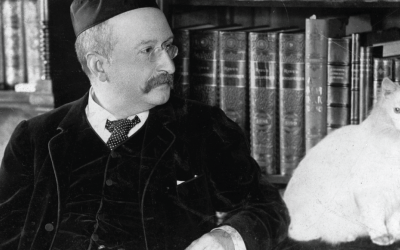Rodger Jackson on the essence of the student/teacher dynamic.
Pretty much every movie thriller includes that moment where the Action Hero turns to his ex-wife/boss/naïve but loyal partner/random sod he just met on the plane and barks at them, “Trust me!” The ubiquity of this scene would lead the cynics to conclude that the standard contract sent out to directors has a clause precluding Payroll from cutting them a cheque until it’s been completed. Be that as it may, the more important question is why, when it happens, do all the philosophers at the Cineplex simultaneously begin yelling up at the screen, “What does that mean!? Is that a conditional or a command? If the later do you really think that people can just will an epistemological stance? If the former, what is the antecedent assuming your statement is the consequent?”
Since academic philosophers have no personal lives to speak of, the source of these outbursts must lie in our professional life. But where? The frustration which fuels such outbursts can’t be grounded in our identifying with the Action Hero. After all, with the possible exception of Patrick Swayze’s character in Road House, most of us never get to combine a philosophy degree from NYU with clearing out a bar full of psychotic rednecks. Committee work? Hardly, we only employ our reptilian brain for those activities. Our scholarship? Perhaps, but this visceral reaction to trust affects aestheticians, logicians, historians, and ethicists alike. Besides, most of us are not so foolish as to really believe our most recent article on non-syntactical modal extensional propositional states identifying intersubjective aesthetic criteria has been poured over by thousands of scholars. We know in our hearts that the average readership for any given article is between 7-10 people, including the author, the editor, and the author’s mother (with serious doubts about the last two).
On the other hand, what we do all share in is that we teach. A 2014 Boise State study, done by what must be avid Dr. Who fans given they call it the TAWKS project, has tried to document the actual behaviour of professors in the wild. It calculates that Monday through Friday more than 60% of our time is divided up between such inspirational activities as “marketing/PR,” “student recruitment,” “phone calls,” “letter writing,” “dinner/receptions,” “e-mails,” “housekeeping,” etc. True, “primary research” and “manuscript writing” do make the list with a whopping combined 5% but nowhere near the 17% allocated to “meetings.” The one piece of good news is that the largest single category is devoted to “teaching” and “teaching related activities” at more than 35%. Thus, despite the innovative and heartfelt struggles of administrators across the nation, we still do a lot of teaching in between our scut work. Acknowledging the central role of teaching in our lives brings us closer to understanding why trust matters so much. If teaching is essential to our identity and trust is essential to teaching then no wonder we get ticked at Hollywood for being so cavalier. Of course, this risks begging the question. After all, who says that trust is central to teaching?
Consider the increasingly dominant vision of teaching, at least in the US, namely that education is a business. This approach can perhaps best be characterised as Fundamentally Education is a Contractual Exchange System (hereafter, known as FECES). FECES views the customer/student as entering a shopping mall/university and picking up the advertising flyer/college bulletin to see which store/class meets his needs in terms of convenience (“Really? 8:30 in the morning? I don’t think so”), ease (“Avoid Smith, you have to write like two papers or something”) and aesthetics (“I’m taking Jones. She scored two chilli peppers on Rate My Professor”). In FECES the free sampler tray/drop-add week, helps facilitate customer satisfaction by allowing the service provider/professor to explain to the customer her products/grades as well as demonstrate her particular skill set/dance like a trained monkey. Under FECES, the syllabus is crucial, occupying as it does multiple roles: it allows the corporate CPA/Assistant Dean to invoice product, it’s a vehicle for comparison shopping for the customers and, perhaps most importantly, once the product is purchased/student enrols, it acts as the contract between customer and service provider. The fact that US law does not recognise a syllabus as a contract is no more relevant than the fact that every university president or provost rapidly drops FECES from his list of guiding pedagogical principle when publically soft-soaping debt ridden parents or applying for re-accreditation. Both contract and FECES are simply different aspects of a mindset which minimises the role of trust while maximising caveat emptor in the life of the university.
Admittedly, an account of contract and trust as strict contraries is a bit of a false dichotomy. The relationship between the two is more complex than that. However, as Annette Baier effectively argued in her classic article, “Trust and Anti-Trust,” we lean on contract in precisely those cases where we wish to minimise trust. To see why this is so we obviously need some working definitions of the two, and again Baier is particularly insightful in this regard. While I’ve tweaked it slightly, her definition of trust is that it is a disposition to make oneself vulnerable by allowing the trusted discretionary power over something one cares about with the confident expectation that the trusted will have the competence and good will to care for it successfully. She then differentiates trust from contract along the following lines,
Contract enables us to make explicit just what we count on another person to do, in return for what, and should they not do just that, what damages can be extracted from them. The beauty of promise and contract is its explicitness... Another functional excellence of contracts, which is closely connected with the expressness that makes breach easily established and damages or penalty decidable with a show of reasonable justice, is the security they offer the trusting party. They make it possible for us not merely to trust at will but to trust with minimal vulnerability. They are a device for trusting others enough for mutually profitable future-involving exchanges without taking the risks trusters usually do take. They are designed for cooperation between mutually suspicious risk-averse strangers... Contracts distribute and redistribute risk so as to minimize it for both parties.
So, how should we understand the professor/student dynamic, as contract or trust? Of course, we need to distinguish between the descriptive and the normative. Given how much FECES dominates US Higher Ed, it may well be that professors and students are in fact “mutually suspicious risk-averse strangers.” Still, this doesn’t tell us which concept should rule the day. We can only answer that question when we know whether teaching is an inherently trust oriented activity or whether it can be equally effective without it. After all, there are many relationships which can be governed by contract because they don’t require trust to enter the picture.
We can start to answer the question by focusing on the nature of the syllabus and highlighting the differences between it and something which actually is a contract, a car mechanic’s estimate. When I take my car to Mike the mechanic the first thing he does is write up an estimate. In so doing, he spells out what he’s going to look at, what he’ll do and what he thinks might need to be done. Even if he’s not sure exactly what’s wrong, he sets up the parameters as precisely he can. As Baier rightly points out, there are good reasons for this explicitness.
To begin with, it allows Mike and me to negotiate with each other. Do I want him to go ahead if this is his proposed solution and this is the cost? I can ask about stopgap measures that would solve the problem temporarily. I can take the car back and ask my idiot cousin to help me try to fix it myself. Moreover, if he wants to get “creative” by going beyond changing the air filter and install a turbocharger, he is obligated to contact me before proceeding. We reopen the negotiation process until both parties agree again. The specificity of the estimate not only limits what Mike can do on his own initiative, it also restricts what he can leave undone. The job is not completed until all the specific tasks listed on the estimate are finished and at the price agreed to by both parties. He can’t return the car and say, “Well, I got through part of the list, but I didn’t bother with the battery or the headlights. Nah, you aren't going to get any of your money back. I'm charging you the original price." Finally, it creates the framework for legal action if need be, as both parties have access to legal recourse if any of the details of the estimate are violated.
None of the above is meant to indicate that mechanics are fundamentally untrustworthy but it does indicate that mechanic/car owner interactions are not essentially trust oriented. Placing contract at the centre of our interaction doesn’t interfere with the relationship. Far from it, it creates a sense of security in both parties. However, placing a contract would not hold for the professor/student dynamic.
While students might be better served if the syllabi were more detailed, it wouldn’t be for the same reasons that a contract needs to be explicit. We can see why this is so when we recognise that people are explicit for different reasons. Professors who hand out a highly detailed syllabus are not doing so for the same kind of reasons that the mechanic is. In the case of the professor it is meant to aid the student in understanding the material, to explain why these topics were chosen, why they are significant, and what path the course is supposed to take.
In part, this is because the purpose of the syllabus is not to provide a foundation for negotiation. From a practical standpoint this is implausible simply because there are severe restrictions as to how well teachers can specify what will happen in the course of the term. Classes have their own dynamics. An individual student might have demands which are beyond the teacher's control. If Tom Brown believes a good education entails vigorous debate with other students, there is little the professor can do if the rest of the class is composed of Harry Flashmans. The flip side of this is that it is next to impossible to list all the demands and requirements that a course may entail. There are many implicit aspects of a course that would be impractical to list in the syllabus. Professors do not include typically specific prohibitions against excessive snoring, or attending class in full leather regalia complete with chained slave at one’s feet (yes, this happened in one of my classes). However, if it happens it would seem odd to have to say, "Gosh darn it, you’re right. I didn't explicitly prohibit S&M, my apologies. However, would you be so kind as to refrain from flaying your submissive until after I’ve demonstrated the proper technique for translating Russell’s definite descriptions into symbolic form?"
Furthermore, to circumscribe the discretionary powers of a teacher in the same way we do with Mike would be disastrous. If the class is becoming confused over a central issue, the professor may want to slow down and devote more time to this particular area. Perhaps he will supplement one of the original articles with another which treats the topic in greater detail. To insist that introducing new material is wrong since this material wasn’t listed in the original syllabus would be ludicrous. The same goes for deciding what to leave out. Teachers sometimes find themselves looking at four weeks of material with one week left in the term. However, no one in their right mind would demand that this material has to be covered on pain of breach of contract. The professor who announces to his class, “Right, we’ve only got two class periods left to cover Volume Two of Theories of Communicative Action, so let’s get cracking,” should be shot on sight.
Finally, the syllabus as contract leads to the idea that a failing grade be thought of as a penalty because a student failed to fulfil his part of the contract. Or, even worse, it reinforces the idea that a class is simply a retail outlet for distributing products, i.e., grades. Unfortunately, due to the proliferation of FECES, many students already see grades this way: product or reward/penalty system. This helps explain why so many students feel wronged when they get a lower than expected grade. It’s a case of either “I’m sorry, but this B- is not what I paid for, can I speak to your manager please?” or “I came to class every day, why’d I get a D+?” In doing so they mistake the grade as the point of the relationship, rather than one of a number of indicators of how successfully they are learning.
Given all this it becomes clear that trust is an essential, that is to say the teacher/student dynamic is an inherently trust oriented relationship. Such relationships are marked by the following features: one of the parties is necessarily vulnerable to the discretionary power of the other, this discretionary power cannot reasonably be eliminated, and the truster needs to believe in the good will and competence of the trusted for their interactions to succeed.
This last element continues to show up in studies of students' own perceptions of their learning experience. Stephen Brookfield, a professor in the department of higher and adult education at Teachers College, Columbia University, New York, conducted extensive research into how students perceive their own learning experience. One of the tools he found most revealing about student learning processes is what he calls "critical incident" questionnaires and exercises. These questionnaires and exercises are designed to elicit specific events that are recalled vividly and easily because of their particular significance. The questionnaires are relatively easy to answer and therefore non-intimidating. Rather than looking for general feelings of the students about the class, the students are asked to remember particular incidents in the class that represent both the highs and lows. They are asked to list the characteristics and behaviours of the teacher they found most helpful to their learning, and give examples of occasions when these traits were observable. The exercises seek much the same kinds of information as the questionnaires but do so in an essay format. Brookfield then compared the data he had accumulated with the data gathered by education researchers on similar topics and reached the following conclusions:
“The importance of trust is highlighted time and again in student's critical incident responses and in the studies of the experience of learning ... In speaking of transformative learning events, students often make explicit mention of how teacher's action and the trust these inspire or destroy, are crucial to learning.”
What emerges out of all this is the Action Hero we began with. The professor walks into room and says “Trust me!” to the students in front of her. The full articulation of this conditional though should be “If you want to succeed in this course, then trust me.” Whether we are worthy of such trust or whether we too often succumb to betrayal is a question for another day.
Rodger Jackson is Professor of Philosophy at Stockton University.
You might also like...

Subscribe to The Philosophers' Magazine for exclusive content and access to 20 years of back issues.














